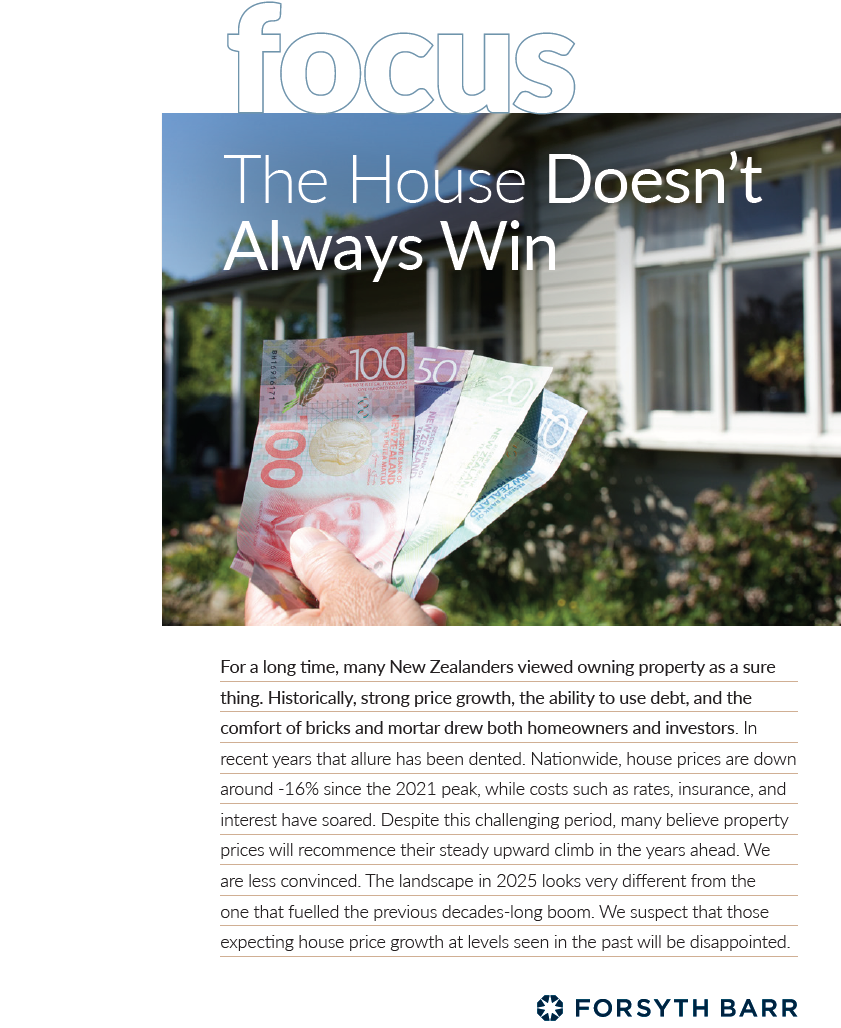Property Investment Alternatives
Explore how diversification across different types of investments can complement or provide an alternative to property investment.
This webpage does not contain financial advice - for financial advice, please speak to a Forsyth Barr Investment Adviser.
They will discuss your financial situation and goals, and explain the risks associated with any potential investment.

Considering new directions for your investment portfolio
Many New Zealanders have built wealth through residential and commercial property. Strong capital gains, stable rental income, and the ability to use leverage have made property a familiar and popular investment choice.
However, today’s market conditions are very different from those of the past 30 years. New Zealand’s property prices remain among the highest in the world relative to income, and long-term returns may be more modest in the years ahead.
Property ownership can also come with challenges - including maintenance costs, limited liquidity, exposure to interest rate and regulatory changes, and the concentration of wealth in a single asset. For those looking to reduce these risks or diversify their wealth, a broader investment portfolio may offer attractive alternatives.
Contact an adviser by completing the form, or read more on the benefits of diversification below.
The benefits of diversification
Diversification involves spreading your investments across different sectors, regions, and asset classes to manage risk and access a wider range of opportunities. Instead of relying on a single property or a few tenants, investors can share in the growth of many companies, industries, and economies - helping to smooth returns over time and support a more balanced portfolio.
Over the long term, share markets have historically delivered strong real (after-inflation) returns. Unlike a property, which remains a single asset, companies can grow their earnings by reinvesting profits into their businesses - allowing investors to benefit from compounding growth over time.
A diversified approach may include:
Listed equities
Ownership in companies, both in New Zealand and globally, that may grow in value and provide regular dividend income.
Listed property and infrastructure
Access to professionally managed portfolios of property and essential services, offering income and inflation protection without the direct costs of ownership.
Fixed interest and cash investments
Bonds and cash funds that can provide regular income and help balance portfolio risk.
Managed funds and ETFs
Professionally managed investments that provide diversification and access to different markets and strategies.
This mix can be tailored to your goals, time horizon, and risk preferences, offering greater flexibility than relying on a single property investment. Understanding the role of each investment type - and the risks involved - helps ensure your portfolio is well suited to you.

Thinking beyond bricks and mortar
Owning property can still play an important role in an investment plan, though it’s sensible not to rely on it as the sole focus. Broadening your investments can help build resilience and open new opportunities for growth, especially in an environment where future property returns are expected to moderate.
As shown in Forsyth Barr’s Stocks vs Property analysis (read here), over long periods equities have historically outperformed property once reinvested dividends are taken into account, and they do so without the upkeep, costs, or concentration risk of a single asset.
Become a client
Speak to an adviser near you
Every investor’s situation is unique. Whether you’re considering reducing property exposure, freeing up capital, or simply exploring more flexible options, a Forsyth Barr Investment Adviser can help you develop a plan aligned to your financial goals.
Talk to a Forsyth Barr Investment Adviser to discuss how a diversified investment strategy could complement - or provide an alternative to - property investing, and to understand the risks and opportunities that come with different approaches.